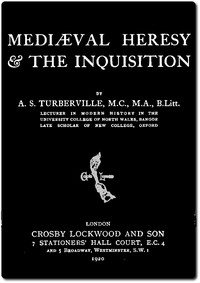Mediæval Heresy & the Inquisition by Arthur Stanley Turberville
"Mediæval Heresy & the Inquisition" by Arthur Stanley Turberville is a historical account written in the early 20th century. The work explores the complex relationship between various heretical movements that emerged in the Middle Ages and the Church's response to them through the Inquisition. With a focus primarily on the origins of heresy and the nature of ecclesiastical power, it seeks to provide insight into the doctrinal conflicts and social conditions that
fueled these movements. The opening of the book sets the stage by describing the historical context of the Middle Ages, establishing a nuanced perspective on what is often referred to as the "Ages of Faith." Turberville asserts that this title does not reflect the whole truth, as various heresies arose from psychological, social, and intellectual tensions within society. He delves into the concept of the "Civitas Dei," emphasizing the intertwined relationship of church and state, and addresses the roots of heresy stemming from clerical abuses and public dissatisfaction. By laying this groundwork, the author suggests that the Inquisition's emergence was a societal response to the perceived threats posed by heretical teachings, highlighting the complexities of faith and authority during this turbulent period. (This is an automatically generated summary.)
Read or download for free
| How to read | Url | Size | |||
|---|---|---|---|---|---|
| Read now! | https://www.gutenberg.org/ebooks/46149.html.images | 782 kB | |||
| EPUB3 (E-readers incl. Send-to-Kindle) | https://www.gutenberg.org/ebooks/46149.epub3.images | 361 kB | |||
| EPUB (older E-readers) | https://www.gutenberg.org/ebooks/46149.epub.images | 370 kB | |||
| EPUB (no images, older E-readers) | https://www.gutenberg.org/ebooks/46149.epub.noimages | 335 kB | |||
| Kindle | https://www.gutenberg.org/ebooks/46149.kf8.images | 615 kB | |||
| older Kindles | https://www.gutenberg.org/ebooks/46149.kindle.images | 577 kB | |||
| Plain Text UTF-8 | https://www.gutenberg.org/ebooks/46149.txt.utf-8 | 587 kB | |||
| Download HTML (zip) | https://www.gutenberg.org/cache/epub/46149/pg46149-h.zip | 321 kB | |||
| There may be more files related to this item. | |||||
About this eBook
| Author | Turberville, Arthur Stanley, 1888-1945 |
|---|---|
| Title | Mediæval Heresy & the Inquisition |
| Alternate Title | Mediæval Heresy and the Inquisition |
| Credits |
Produced by Chris Curnow, Turgut Dincer, and the Online Distributed Proofreading Team at www.pgdp.net. (This file was produced from images generously made available by The Internet Archive.) |
| Reading Level | Reading ease score: 49.6 (College-level). Difficult to read. |
| Language | English |
| LoC Class | BR: Philosophy, Psychology, Religion: Christianity |
| Subject | Heresy |
| Subject | Sects, Medieval |
| Subject | Inquisition |
| Category | Text |
| EBook-No. | 46149 |
| Release Date | Jun 30, 2014 |
| Most Recently Updated | Oct 24, 2024 |
| Copyright Status | Public domain in the USA. |
| Downloads | 733 downloads in the last 30 days. |
| Project Gutenberg eBooks are always free! | |

